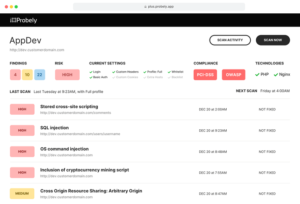Website Vulnerability
Website vulnerability scanners are tools that can find flaws in your website’s code. These tools can detect security vulnerabilities and provide reports for your website’s security. They can scan all types of web applications, including custom coded applications and open-source software. Many of them can also scan web server configuration issues and detect vulnerabilities in scripts.
There are several different types of website vulnerability scanners, and determining which is right for your website can be a challenging task. However, luckily, there are several excellent free website vulnerability scanners available. These programs can identify potential vulnerabilities in your website and provide you with a final report for your review. These programs also work on various platforms, including Windows and Linux.
Another website vulnerability scanner is UpGuard, which gives you an idea of how secure your website is. It can detect security holes in your website and detect hack attacks. However, it is not very good at finding complex or new malware. Also, it takes a while to display results. In addition, UpGuard is not free. Depending on your needs, you might have to pay for the paid version of this scanner.
CMS-based websites can also be vulnerable. Popular CMS systems are WordPress, Joomla, and Drupal. These platforms are vulnerable to hacking attacks, so you need to be extra careful with these CMS systems. A CMS vulnerability scanner such as WPScan is available for these platforms. However, not all of these CMS systems can be scanned with WPScan.

Website Vulnerability Scanners
A website vulnerability scanner is a software program that automatically scans a website’s code for flaws. It finds structural vulnerabilities that hackers can exploit. It also checks the network connection, firewalls, Antivirus, and Antimalware systems for their latest security definitions. A website vulnerability scanner is a great tool to protect your website from attacks and breaches.
Most modern website vulnerability scanner tools are fully automated and run on the backend without disrupting the performance of your site. They are able to scan thousands of web pages with minimal interruptions. They can also be cloud-based or online, which means they will not interfere with your site’s performance. In addition, the best website vulnerability scanner tools are intelligent and can quickly crawl large volumes of web pages.
Another benefit of using website vulnerability scanners is that they can be integrated into the Software Development Lifecycle (SDLC). Web vulnerability scanners can help find errors and vulnerabilities at early development stages. This can accelerate application development and improve its security. Furthermore, they can help with holistic asset discovery, providing complete coverage of your assets.
Cross-Site scripting (XSS) attacks target website visitors and operate by injecting scripts into the website’s input fields. In order to prevent these attacks, input fields must be sanitized. If not, browsers will not be able to distinguish between the script and the website’s content.


